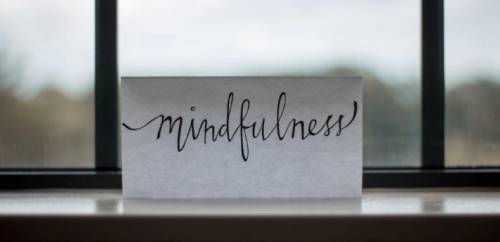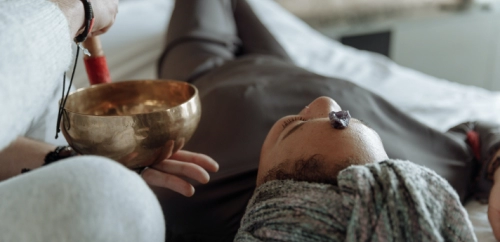Mindfulness Practice: A Quick Guide To Figuring Out How To Live In The Present

Being present allows you to experience everything fully.
But so many of us wander through our lives constantly living in the past or stressing about the future, which only exacerbates the problems. The truth is, we don’t have to live like that.
By including a consistent mindfulness practice in our daily lives, we can be more in the moment and truly enjoy our lives with little to no stress. Mindfulness may seem like a fad word or just another self-help trend, but there are tons of amazing benefits to taking advantage of.
These benefits will not only help your mental health but also your physical and, for those looking for it, spiritual health as well.
How do you ask? Let’s take a look at that and what exactly mindfulness actually is.
Defining Mindfulness
When it boils right down to it, a mindfulness practice will allow you to be able to teach yourself how to be in the moment. These practices train your mind to not be so reactionary and more alert to the beautiful world that is around us every day.
This is not a foreign skill for humans, but unfortunately, as the world continues to get more hectic, we seem to be forgetting it. This is why in order to be present in our lives and the world around us, there are mindfulness practices we need to do on a daily basis.
On a basic level, being more aware is going to help you enjoy life more with less stress. But, along with this amazing benefit, there are scientific studies that have shown that using mindfulness techniques and practices actually affects your brain. This, in turn, allows your mindfulness practice to be a key component in improving your overall health.
Before You Add Mindfulness To Your Life: Tips For Beginners
Most people, when they look to make lifestyle changes, are super nervous about having the right whatever it is they think they need to have. This can make the move quite stressful, which seems counterintuitive to the idea of a mindfulness practice. So to alleviate that stress a bit, we thought we would share a few things we think are important for beginners to understand.
- There is no set gear list. You do not have to go out and spend hundreds of dollars to begin. Mindfulness can be done anywhere. You just need a quiet place and a few techniques to help you begin to quiet your thoughts.
- You will never completely quiet your mind. You don’t have to have a blank mind to be mindful of your world. The goal is to pay attention to your thoughts and to be able to identify the ones that are not beneficial to your inner peace.
- Let your mind wander a bit. But as it does, the more mindful you get, the better you will be at bringing your mind back to the present.
- You may find your mind being a little judgmental. Everyone has an inner critic, and they can be very loud, especially when we are looking inward. You will need to acknowledge these thoughts, but then let them go as well. This is going to be challenging at first, but as you develop a consistent mindfulness practice, it will get easier and easier.
- In the end, mindfulness is all about returning your thoughts to the here and now. This can easily be done through breathwork.
Daily Mindfulness Practices
Mindfulness starts with intentions, and one of the best times to set these intentions is first thing in the morning. After a night of rest and rejuvenation, your brain is ready to receive new thoughts in the morning.
You can start by relaxing in a comfortable place and then take several deep breaths. While doing this, you should focus on why you are looking to build a mindfulness practice into your day. What are you looking to accomplish and such?
You can also add some mindfulness practices into your eating routines as well. By breathing and really paying attention to your body, you can be more present in this aspect of your life as well. Things like only eating in quiet surroundings, only eating when you are hungry, and not eating things you do not like are all ways mindfulness can be used when eating.
Many people work mindfulness into their workout routines as well.
This is a great place to use those intention-setting skills you worked on first thing in the morning. Once you have made it clear to yourself what you are looking to accomplish with your workout, you can then set up a rhythm and also add in a cooldown period as well.
These are just a few mindfulness practices you can add to your daily routines. There are so many more like meditation and yoga that, coupled with the practices we outlined above, will be a great way to build a consistent and effective mindfulness practice.
Benefits of Mindfulness Practices
Now that we have given you a good foundation for your practices, we wanted to take a few minutes to look at why a mindfulness practice is such a great option for your daily life. There are so many amazing benefits, but here are some of the biggest ones that will have the most impact:
- Improve Your Sleep: When our head hits that pillow, many of us begin to think about our days and all the anxiety-riddled activities we have gone through that day. This makes getting to sleep hard, but it also means that often we don’t get good sleep. With the breathing skills and other techniques you refine with a mindfulness practice you can relax faster and this, in turn, triggers certain parts of the brain that release hormones like serotonin and melatonin that are needed for good sleep.
- Reduce Stress: There is a whole wealth of benefits to reducing your stress. Not only will you have better sleep, but you can affect your mental health and reduce things like burnout and even depression.
- Help Increase Focus: Many people have a problem focusing with so many distractions available to them. But a mindfulness practice is designed to help improve that focus. Since many of the techniques used involve sitting and really being present, it is only inevitable that focus will increase.
- Lower Anxiety: Meditation is a crucial part of almost every mindfulness practice. Many studies have shown the effects on the anxiety that even just one hour of meditation has on an individual’s life. Not only is this great for the mind, but many of those studies also show a reduced strain on internal organs as well.
- Build Cognitive Abilities: The more we use our minds and the less stress we put our bodies through, the less likely we are to have deteriorating cognitive skills. This means a mindfulness practice is a perfect option for those that may have a disease like Alzheimer’s in their family. Though it is not a cure, it can definitely be a tool that will help in the long run.
Final Thoughts
So you can see, by adding a mindfulness practice into your daily life, you can alleviate a lot of potential issues. On top of that, it will allow you to live in the moment and be more present for yourself and those you love. This is something that most of us desperately want and, it is not that hard to achieve. It just takes patience, consistency, and dedication to include mindfulness techniques into your routines!















